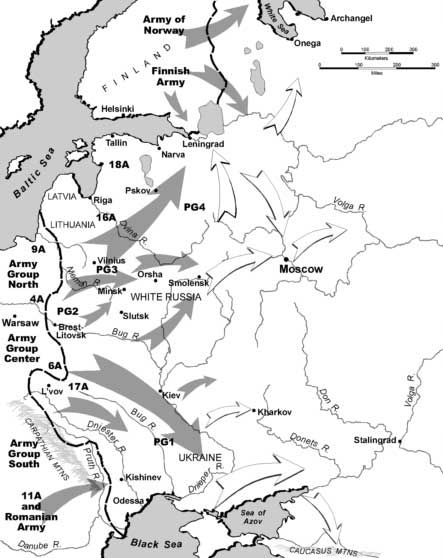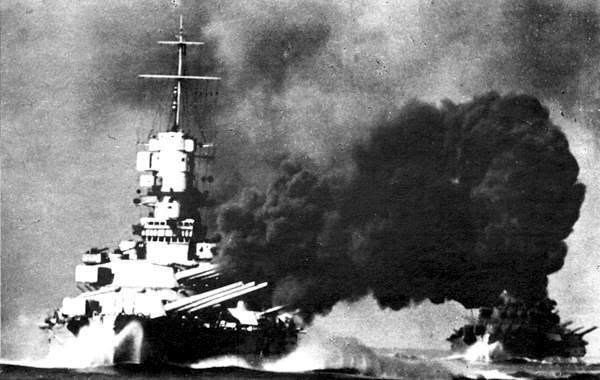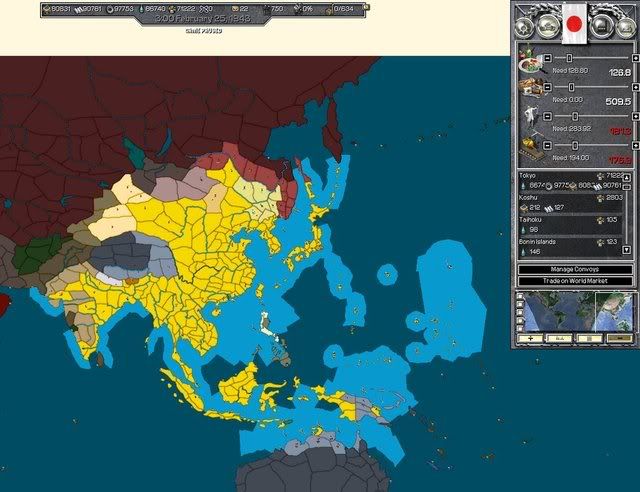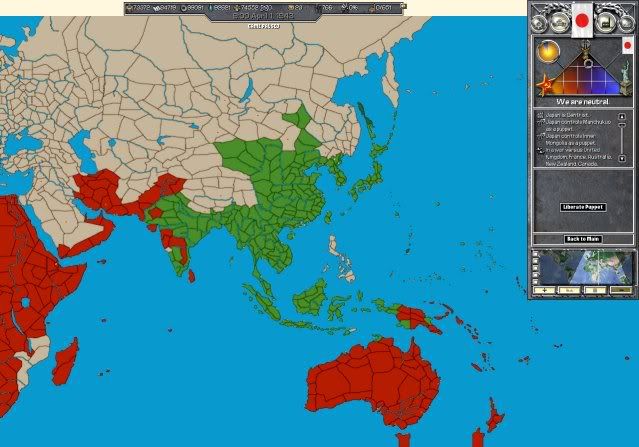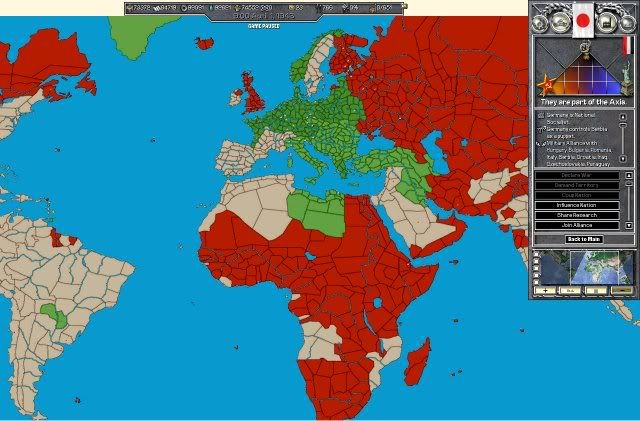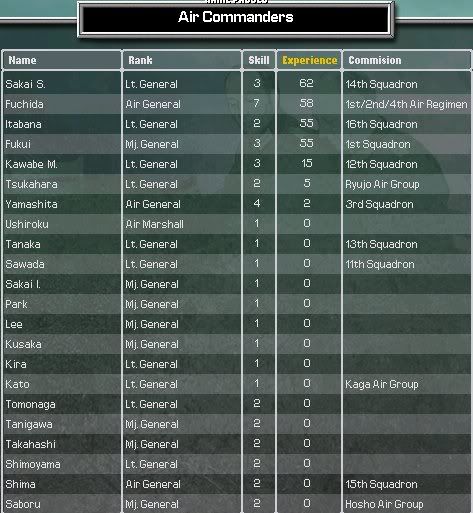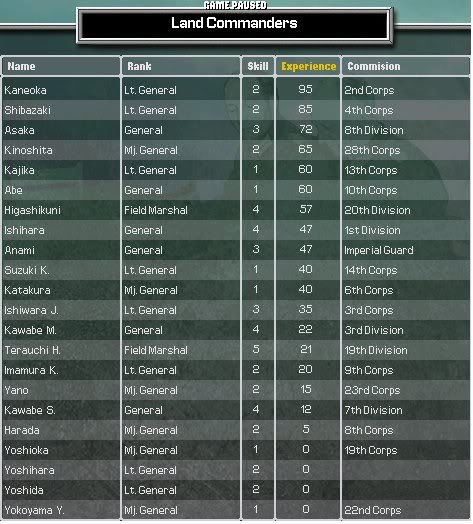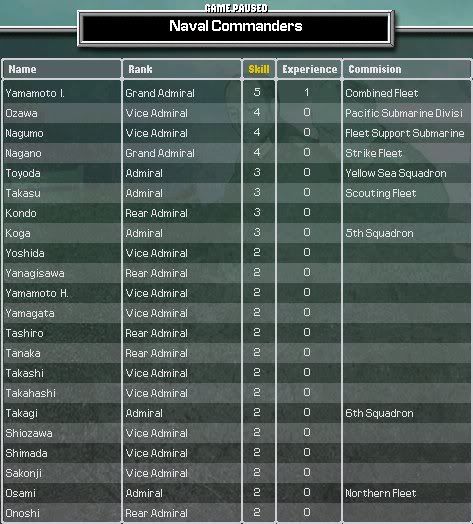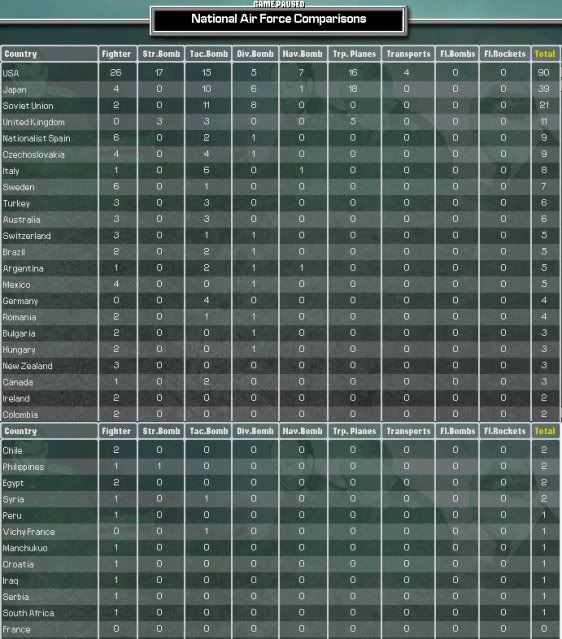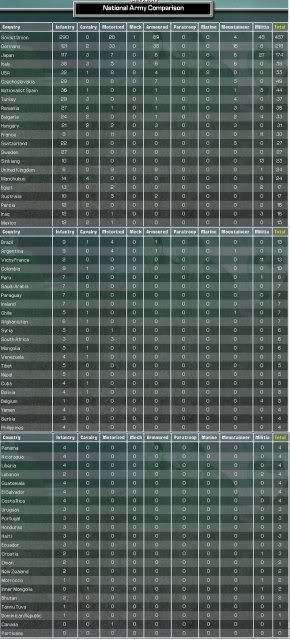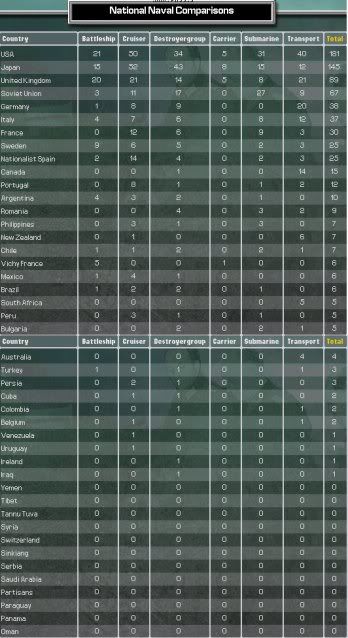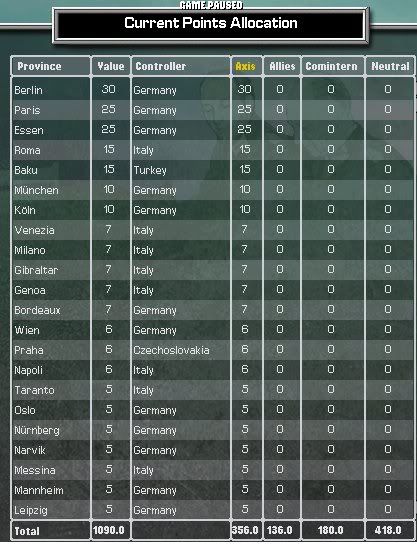Winter 1940-1941
Events in Europe were spiraling quickly out of control for the Western Allies and times were looking quite desperate indeed for England. First the peaceful takeovers of Austria and Czechoslovakia preceded the swift conquest of Poland and Belgium, and now recently Netherlands and France. Norway looked to be the next target but how exactly Germany would manage that from German ports whilst English ships prowled the North Sea remained to be seen. Indignation and outrage were rampant among many neutral nations, including the United States but policies or governments prevented any action. As such, the United Kingdom looked quite like it was on its own in Europe.
For Japan there wasn’t much worrying the nation – Nationalist China had been defeated and Communist Chinese strongholds looked to be reduced very shortly. Their primary concern at this point was finding some way to gain the resources they so desperately needed. Economists estimated that at the current rate of industrial expansion and use of oil by the military about six months of full resource usage would be remaining and about another year after that before coal reserves were tapped out. Fortunately for these economists, the Japanese military hierarchy had a plan that they would see enacted very soon…
First light, 9th December, 1940, Communist Chinese fortifications around Xianyang city
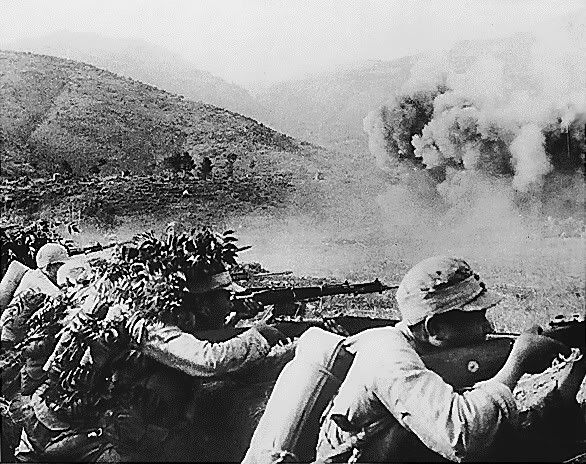
The air was frigid and the tough ground cold with the early winter. The Communist Chinese defenders had hoped the Japanese would put off attacking for several months, at least until the weather became better. They were sorely disappointed though when three dozen divisions began their offensive operations in the Xianyang province. The Chinese melted away after inflicting only a few casualties to their prepared defenses. More time would have been needed to prepare better fortifications but for now trenches and the occasional log bunker would have to do. Military command had indicated that the attackers would quite possibly make a determined push first thing in the morning and all eyes in the trenches now awaited the inevitable. Some took small comfort that at least it would not be the IJN Marine Corps attacking today.
Within minutes thousands of artillery shells rained their destructive fire onto the hard-pressed defenders and many died in the frozen trenches dug months earlier. The hell storm lasted about thirty minutes as the Japanese spared little expense in effort to dislodge the defenders. At the appropriate time the shells began to peter out then cease entirely and within seconds whistle blowing indicated to the defenders that the Japanese attack would finally commence. A low thumping noise was heard suddenly and this puzzled the Chinese for only a moment when white, phosphorous smoke began to appear over the battleground. In minutes the ground was wreathed in the wispy vapors that would obfuscate the Japanese ground troops. The next sound heard was a low drone gradually building up as hundreds of Japanese bombers began to make their appearance over the field. Dropping their load of bombs they were gone as quickly as they came and scarcely minutes later the first Japanese army units were upon the defenders.
The attack was highly organized and well-maintained and in retrospect excellently planned. The coordinated efforts of the artillery, aircraft bombings, and smoke to mask the attackers’ approach worked so well to force the defenders to flee. The battle was over in a little under four hours with a huge route of the bewildered Chinese defenders. Fortunately for them, only a small portion of the overall Chinese strength was in Xianyang and many that fought there this day would escape to fight again up north. This however was merely a test for the Japanese high command and one that the armed forces had passed with flying colors.
28th of December, 1940, Imperial General Headquarters
Even with the slow period of military maneuvers in the winter, the halls of the headquarters building was still bustling with bodies as staff members dashed from room to room along its many hallways. Workers were putting finishing touches on the doors and walls as the massive improvement project was nearing completion. Behind the cherry paneled double doors General Anami and his staff did not notice much that went on elsewhere as they were busy enough reading and collating reports. The initial reports from Xianyang province had been corroborated by photo reconnaissance flights the last two weeks as well as long-range recon troops on the ground. The communist forces had indeed fled and the few remaining holdouts had been rounded up and summarily executed.
Research this month had proved quite fruitful for Anami’s Army with design sets created for some Improved Infantry Weapons. In addition a Motorized Logistics Organization doctrine had been developed, particularly in response to the events preceding the buildup around Xianyang. This would allow the army to better provide their own supply lines and even enable troops to fight longer while on the move. Additionally, a Corps Long-Range Reconnaissance Doctrine was created to provide the armies with advance intelligence about what (if anything) lie in wait ahead of their advance. All in all some excellent work and the scientists and researchers were working on even more promising technology over the next two months!
Issuing final orders for his men to form up around Yanan province, Anami looked toward a March operation that would see the final destruction of the Communist Chinese. In addition, he awaited word that the forces he sent west to Sinkiang would be ready for their assaults on Golmud province. Soon, if all went well and according to plan, Anami would be able to visit the Emperor with news that all of China lay at his disposal.
Excerpted from How the East was Won by Robert Kincaid
…implications of the Robert Taft administration would not be felt for quite some time and for now there was little the US could do other than enact the Selective Service Act one week after Taft’s Inauguration. The administration even followed through on several of President Roosevelt’s policies and passed a complete Trade Embargo on the 7th of February, in an attempt to halt all incoming trade to the empire. As Japan was receiving most of its trade via third parties anyway, this did little other than to keep relations as frosty as they were previously. The question this author challenges the reader with is “What if the US had done differently?” and is an answer we may never know. Regardless, the now impotent Americans continued their policies of keeping a hands-off outlook in Europe and Asia and worried more about their own pressing problems.
In Europe the winter of ’40 and ’41 proved to be a rather hot one…diplomatically and in war. The snows and ice did little to slow down Hitler’s ambitions. First Italy joined the Axis alliance in late December and when Germany declared on Denmark they did as well, albeit as a show of support like Hungary, Bulgaria, and Romania. Apparently though the German military knew where the main efforts would lay as it would take nearly a month for Germany to consolidate their conquest of this tiny nation. No, the main efforts would be shown a week after Hitler’s declaration of war on Denmark with a completion of their conquest in Yugoslavia on February 23rd. Hitler for once though saw the wisdom in appeasing as many of his newfound friends as possible and portioned Yugoslavia accordingly. Hungary, Romania, Bulgaria, and Italy all got slices of the Yugoslav pie and to help keep down maintenance costs Germany saw to the creation of an independent state of both Croatia and Serbia. Both naturally were nothing more than puppet states to Hitler as the new nations immediately sworn allegiance to Hitler and joined the Axis military alliance, but all was good. Luxemburg even saw the futility of having an active defense against Germany and accepted Hitler’s demands, ceding the tiny country to their rampaging neighbor.
1941 was hardly two months over before Hitler went with his next step of his grand plan and went onward to Athens by declaring war on Greece. Italy and Bulgaria of course stood to gain the most from this event but there were other benefits for the Western Allies. Britain saw a cessation of partisan activity in Cyprus with Cypriot volunteers signing up to join in the Greek campaign. The United Kingdom made certain that this ally would be able to make a stand by sending Greek some badly needed aid. Sadly for Denmark the only aid Britain could give them when the country was wholly engulfed on March 7th was to send their Marines to Iceland and Greenland, ensuring these countries would necessarily stay out of the conflict…
Interlude
Japan’s industry churned out at least four sub fleets in the cold winter climes as these underwater boats cared little if the weather above was frightful. In addition nearly half a dozen more infantry units were formed for defensive duties in China and rightly were sent off on newly built transport ships. Industries in two dozen provinces saw improvement and upgrade projects to fruition as the Japanese industrial might flexed for the entire world to see. Researchers and scientists were busy as well with some Advanced Naval Designs being created for the Imperial Japanese Navy. The Army saw Front-Line Medical Stations, Advanced Man Portable Radio Sets, a Divisional Offensive Organization, and Advanced Long-Range Radio Sets designed all for their use. The Air Force even had some success in the creation of an Advanced Decimetric Radar system. The workers though would not rest as the coming season would attest to…
Note: The first province went down easy, but then there were only 6 units defending it. 22 in Yanan province (/shudder) so needless to say I was rather nervous. All this time I maneuvered my units around the provinces and then allowed them to regain org before making my next great push. I was a bit surprised to see Germany break Yugoslavia up but then on reflection most CORE games I play as Germany…very few times have I played as another country.
Events in Europe were spiraling quickly out of control for the Western Allies and times were looking quite desperate indeed for England. First the peaceful takeovers of Austria and Czechoslovakia preceded the swift conquest of Poland and Belgium, and now recently Netherlands and France. Norway looked to be the next target but how exactly Germany would manage that from German ports whilst English ships prowled the North Sea remained to be seen. Indignation and outrage were rampant among many neutral nations, including the United States but policies or governments prevented any action. As such, the United Kingdom looked quite like it was on its own in Europe.
For Japan there wasn’t much worrying the nation – Nationalist China had been defeated and Communist Chinese strongholds looked to be reduced very shortly. Their primary concern at this point was finding some way to gain the resources they so desperately needed. Economists estimated that at the current rate of industrial expansion and use of oil by the military about six months of full resource usage would be remaining and about another year after that before coal reserves were tapped out. Fortunately for these economists, the Japanese military hierarchy had a plan that they would see enacted very soon…
First light, 9th December, 1940, Communist Chinese fortifications around Xianyang city

The air was frigid and the tough ground cold with the early winter. The Communist Chinese defenders had hoped the Japanese would put off attacking for several months, at least until the weather became better. They were sorely disappointed though when three dozen divisions began their offensive operations in the Xianyang province. The Chinese melted away after inflicting only a few casualties to their prepared defenses. More time would have been needed to prepare better fortifications but for now trenches and the occasional log bunker would have to do. Military command had indicated that the attackers would quite possibly make a determined push first thing in the morning and all eyes in the trenches now awaited the inevitable. Some took small comfort that at least it would not be the IJN Marine Corps attacking today.
Within minutes thousands of artillery shells rained their destructive fire onto the hard-pressed defenders and many died in the frozen trenches dug months earlier. The hell storm lasted about thirty minutes as the Japanese spared little expense in effort to dislodge the defenders. At the appropriate time the shells began to peter out then cease entirely and within seconds whistle blowing indicated to the defenders that the Japanese attack would finally commence. A low thumping noise was heard suddenly and this puzzled the Chinese for only a moment when white, phosphorous smoke began to appear over the battleground. In minutes the ground was wreathed in the wispy vapors that would obfuscate the Japanese ground troops. The next sound heard was a low drone gradually building up as hundreds of Japanese bombers began to make their appearance over the field. Dropping their load of bombs they were gone as quickly as they came and scarcely minutes later the first Japanese army units were upon the defenders.
The attack was highly organized and well-maintained and in retrospect excellently planned. The coordinated efforts of the artillery, aircraft bombings, and smoke to mask the attackers’ approach worked so well to force the defenders to flee. The battle was over in a little under four hours with a huge route of the bewildered Chinese defenders. Fortunately for them, only a small portion of the overall Chinese strength was in Xianyang and many that fought there this day would escape to fight again up north. This however was merely a test for the Japanese high command and one that the armed forces had passed with flying colors.
28th of December, 1940, Imperial General Headquarters
Even with the slow period of military maneuvers in the winter, the halls of the headquarters building was still bustling with bodies as staff members dashed from room to room along its many hallways. Workers were putting finishing touches on the doors and walls as the massive improvement project was nearing completion. Behind the cherry paneled double doors General Anami and his staff did not notice much that went on elsewhere as they were busy enough reading and collating reports. The initial reports from Xianyang province had been corroborated by photo reconnaissance flights the last two weeks as well as long-range recon troops on the ground. The communist forces had indeed fled and the few remaining holdouts had been rounded up and summarily executed.
Research this month had proved quite fruitful for Anami’s Army with design sets created for some Improved Infantry Weapons. In addition a Motorized Logistics Organization doctrine had been developed, particularly in response to the events preceding the buildup around Xianyang. This would allow the army to better provide their own supply lines and even enable troops to fight longer while on the move. Additionally, a Corps Long-Range Reconnaissance Doctrine was created to provide the armies with advance intelligence about what (if anything) lie in wait ahead of their advance. All in all some excellent work and the scientists and researchers were working on even more promising technology over the next two months!
Issuing final orders for his men to form up around Yanan province, Anami looked toward a March operation that would see the final destruction of the Communist Chinese. In addition, he awaited word that the forces he sent west to Sinkiang would be ready for their assaults on Golmud province. Soon, if all went well and according to plan, Anami would be able to visit the Emperor with news that all of China lay at his disposal.
Excerpted from How the East was Won by Robert Kincaid
…implications of the Robert Taft administration would not be felt for quite some time and for now there was little the US could do other than enact the Selective Service Act one week after Taft’s Inauguration. The administration even followed through on several of President Roosevelt’s policies and passed a complete Trade Embargo on the 7th of February, in an attempt to halt all incoming trade to the empire. As Japan was receiving most of its trade via third parties anyway, this did little other than to keep relations as frosty as they were previously. The question this author challenges the reader with is “What if the US had done differently?” and is an answer we may never know. Regardless, the now impotent Americans continued their policies of keeping a hands-off outlook in Europe and Asia and worried more about their own pressing problems.
In Europe the winter of ’40 and ’41 proved to be a rather hot one…diplomatically and in war. The snows and ice did little to slow down Hitler’s ambitions. First Italy joined the Axis alliance in late December and when Germany declared on Denmark they did as well, albeit as a show of support like Hungary, Bulgaria, and Romania. Apparently though the German military knew where the main efforts would lay as it would take nearly a month for Germany to consolidate their conquest of this tiny nation. No, the main efforts would be shown a week after Hitler’s declaration of war on Denmark with a completion of their conquest in Yugoslavia on February 23rd. Hitler for once though saw the wisdom in appeasing as many of his newfound friends as possible and portioned Yugoslavia accordingly. Hungary, Romania, Bulgaria, and Italy all got slices of the Yugoslav pie and to help keep down maintenance costs Germany saw to the creation of an independent state of both Croatia and Serbia. Both naturally were nothing more than puppet states to Hitler as the new nations immediately sworn allegiance to Hitler and joined the Axis military alliance, but all was good. Luxemburg even saw the futility of having an active defense against Germany and accepted Hitler’s demands, ceding the tiny country to their rampaging neighbor.
1941 was hardly two months over before Hitler went with his next step of his grand plan and went onward to Athens by declaring war on Greece. Italy and Bulgaria of course stood to gain the most from this event but there were other benefits for the Western Allies. Britain saw a cessation of partisan activity in Cyprus with Cypriot volunteers signing up to join in the Greek campaign. The United Kingdom made certain that this ally would be able to make a stand by sending Greek some badly needed aid. Sadly for Denmark the only aid Britain could give them when the country was wholly engulfed on March 7th was to send their Marines to Iceland and Greenland, ensuring these countries would necessarily stay out of the conflict…
Interlude
Japan’s industry churned out at least four sub fleets in the cold winter climes as these underwater boats cared little if the weather above was frightful. In addition nearly half a dozen more infantry units were formed for defensive duties in China and rightly were sent off on newly built transport ships. Industries in two dozen provinces saw improvement and upgrade projects to fruition as the Japanese industrial might flexed for the entire world to see. Researchers and scientists were busy as well with some Advanced Naval Designs being created for the Imperial Japanese Navy. The Army saw Front-Line Medical Stations, Advanced Man Portable Radio Sets, a Divisional Offensive Organization, and Advanced Long-Range Radio Sets designed all for their use. The Air Force even had some success in the creation of an Advanced Decimetric Radar system. The workers though would not rest as the coming season would attest to…
Note: The first province went down easy, but then there were only 6 units defending it. 22 in Yanan province (/shudder) so needless to say I was rather nervous. All this time I maneuvered my units around the provinces and then allowed them to regain org before making my next great push. I was a bit surprised to see Germany break Yugoslavia up but then on reflection most CORE games I play as Germany…very few times have I played as another country.


